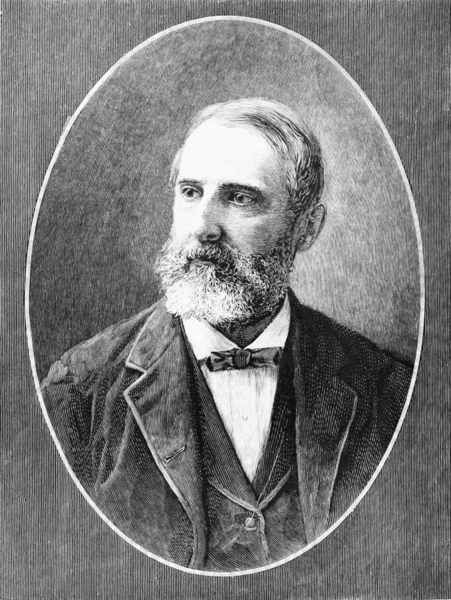Egleston Scholars Program: Supporting Extraordinary Achievements
The Egleston Scholars Program is named after Professor Thomas Egleston, founder of the Columbia School of Mines in 1864. Known in his time as a foremost expert on mining and metallurgy, Egleston served as President of the American Institute of Mining Engineers, and twice received France’s highest decoration, Légion d'honneur.

The Thomas Egleston Medal for Distinguished Engineering Achievement was established in 1939 in his honor and is the School’s most prestigious alumni award, recognizing graduates of Columbia Engineering who have made exceptional contributions to the world of engineering and applied science.
In this spirit, the Egleston Scholars Program recognizes undergraduate students of Columbia Engineering who embody the mission of the School at large: “to educate socially-responsible engineering and applied science leaders whose work results in the betterment of the human condition, locally, nationally, and globally.” The first Egleston scholars will graduate in 2014, commemorating the school’s 150th anniversary. These scholars comprise the top one percent of Columbia Engineering applicants, recognized for their extraordinary achievements and promise as an engineering and applied science student, researcher, and leader.
The Egleston Scholars Program is a comprehensive four-year program designed to support and enrich the undergraduate experience of the most highly accomplished students through select access to resources within Columbia Engineering, the University at large, New York City, and throughout the world. The Program makes available a stipend to support each scholar’s academic and professional goals, numerous research opportunities, faculty mentorship, enhanced team advising, as well as the opportunity to participate in the larger community of the Columbia Undergraduate Scholars Program.
What does the Egleston Scholars Program offer?
- A $10,000 Stipend
Scholars each have access to a stipend which can be used to attend professional conferences, purchase research materials and fund room and board when conducting research over the summer. - Guaranteed Research Opportunities
Egleston Scholars have access to undergraduate research positions with Columbia Engineering faculty as early as their first year. - Research and Leadership in Engineering Seminar
An exclusive seminar for Egleston Scholars in their first semester to guide them through the scientific process. - Faculty Mentorship
Each Scholar is paired with a faculty mentor. - Enhanced Advising
Scholars are supported by a team of advisers in addition to their faculty mentors. - Specialized Workshops with the Center for Career Education (CCE)
Scholars meet with designated CCE advisers to explore career and graduate school options and to build networking, interviewing and presentation skills. - Columbia Undergraduate Scholars Program (CUSP)
Egleston Scholars are members of the larger community of scholars through the Columbia Undergraduate Scholars Program. - Networking Opportunities
Scholars are invited to exclusive events with Columbia deans and prominent Columbia Engineering alumni. - Enhanced Financial Aid
Scholars who have applied for and been awarded Columbia need-based aid receive an enhanced aid package that promotes access to unpaid opportunities. These enhancements mean that:
- University grants replace work-study for all four years.
- The summer work expectation is waived during summers in which Scholars utilize their Egleston summer stipends.
The above is in addition to Columbia’s already generous financial aid policies. - Egleston Scholars E-Board
As an Egleston Scholar, you are immediately part of an instant community of likeminded, engaged and interested students who come together for academic and social reasons.
To support and enhance the opportunities above, the student E-Board offers social and cultural opportunities to foster community among the Egleston Scholars across all four years and including alumni.
Some examples of research in which Egleston Scholars are engaged:
- Biomedical Engineering
Deciphering the roles of mechanotaxis and chemotaxis in the formation of capillary-like structures with Professor Sam Sia, Biomedical Engineering - Chemical Engineering
Developing systems of electrochemical cells and bioreactors in order to use reduction of iron as the source of fuel production with Professor Alan C. West - Chemical Engineering
Researching the efficacy of tantalum carbide compounds in hydrogen evolution reactions with Professor Jingguang Chen, Chemical Engineering - Applied Mathematics
Developing a 2-D and 3-D model for drug diffusion from coated bone implants with Tobias Klepsch in Lübeck, Germany - Mechanical Engineering
Studying a protein, transforming growth factor-beta (TGF-B), which is important for cartilage mechanical properties, with Professor Gerard Ateshian, Mechanical Engineering - Undecided
Studying electrospin polymer scaffolds for complex tissue regeneration with Professor Helen Lu, Biomedical Engineering - Computer Science
Investigating hardware security vulnerability in the Computer Architecture and Security Technologies Lab with Professor Simha Sethumadhavan, Computer Science
